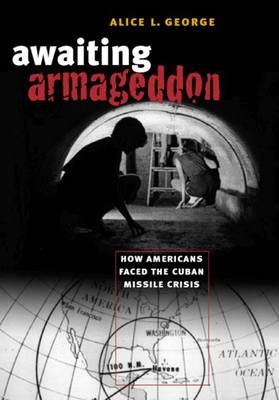
Awaiting Armageddon
How Americans Faced the Cuban Missile Crisis
Seiten
2003
|
New edition
The University of North Carolina Press (Verlag)
978-0-8078-2828-1 (ISBN)
The University of North Carolina Press (Verlag)
978-0-8078-2828-1 (ISBN)
- Titel ist leider vergriffen;
keine Neuauflage - Artikel merken
For 13 days in October 1962, America stood on the brink of nuclear war. This is an in-depth look at this crisis as it roiled outside of government offices, where ordinary Americans realized their government was unprepared to protect either itself or its citizens from the dangers of nuclear war.
For 13 days in October 1962, America stood on the brink of nuclear war. Nikita Khrushchev's decision to place nuclear missiles in Cuba and John F. Kennedy's defiant response introduced the possibility of unprecedented cataclysm. The immediate threat of destruction entered America's classrooms and its living rooms. This text takes an in-depth look at this crisis as it roiled outside of government offices, where ordinary Americans realized their government was unprepared to protect either itself or its citizens from the dangers of nuclear war. During the seven days between Kennedy's announcement of a naval blockade and Khrushchev's decision to withdraw Soviet nuclear missiles from Cuba, US citizens absorbed the nightmare scenario unfolding on their television sets. An estimated ten million Americans fled their homes; millions more prepared shelters at home, clearing the shelves of supermarkets and gun stores. Alice George seeks to capture the irrationality of the moment as Americans coped with dread and resignation, humour and pathos, terror and ignorance. In her examination of the public response to the missile crisis, the author reveals cracks in the veneer of American confidence in the early years of the space age and demonstrates how the fears generated by Cold War culture blinded many Americans to the dangers of nuclear war until it was almost too late.
For 13 days in October 1962, America stood on the brink of nuclear war. Nikita Khrushchev's decision to place nuclear missiles in Cuba and John F. Kennedy's defiant response introduced the possibility of unprecedented cataclysm. The immediate threat of destruction entered America's classrooms and its living rooms. This text takes an in-depth look at this crisis as it roiled outside of government offices, where ordinary Americans realized their government was unprepared to protect either itself or its citizens from the dangers of nuclear war. During the seven days between Kennedy's announcement of a naval blockade and Khrushchev's decision to withdraw Soviet nuclear missiles from Cuba, US citizens absorbed the nightmare scenario unfolding on their television sets. An estimated ten million Americans fled their homes; millions more prepared shelters at home, clearing the shelves of supermarkets and gun stores. Alice George seeks to capture the irrationality of the moment as Americans coped with dread and resignation, humour and pathos, terror and ignorance. In her examination of the public response to the missile crisis, the author reveals cracks in the veneer of American confidence in the early years of the space age and demonstrates how the fears generated by Cold War culture blinded many Americans to the dangers of nuclear war until it was almost too late.
Alice L. George is a historian and former newspaper editor who lives in Philadelphia, Pennsylvania.
| Erscheint lt. Verlag | 31.10.2003 |
|---|---|
| Verlagsort | Chapel Hill |
| Sprache | englisch |
| Maße | 156 x 235 mm |
| Gewicht | 526 g |
| Themenwelt | Geschichte ► Allgemeine Geschichte ► Zeitgeschichte |
| Geisteswissenschaften ► Geschichte ► Regional- / Ländergeschichte | |
| Geschichte ► Teilgebiete der Geschichte ► Kulturgeschichte | |
| Geschichte ► Teilgebiete der Geschichte ► Militärgeschichte | |
| Sozialwissenschaften ► Politik / Verwaltung | |
| ISBN-10 | 0-8078-2828-9 / 0807828289 |
| ISBN-13 | 978-0-8078-2828-1 / 9780807828281 |
| Zustand | Neuware |
| Haben Sie eine Frage zum Produkt? |
Mehr entdecken
aus dem Bereich
aus dem Bereich
Gewalt, Umwelt, Identität, Methode
Buch | Softcover (2024)
Spector Books OHG (Verlag)
36,00 €
wie Freud im Kollektiv verschwand
Buch | Hardcover (2024)
Klett-Cotta (Verlag)
25,00 €


